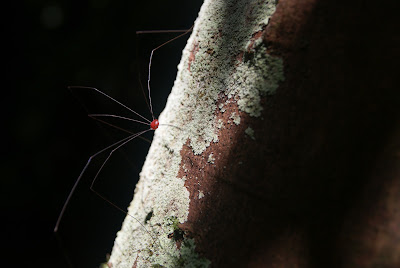Among the numerous forests and national reserves, the
Sinharaja Rainforest Reserve stood out to us, after all how often do you get to
visit a rainforest? We opted to book our rainforest trek through our
guesthouse, which turned out to be excellent foresight. The tuk-tuk ride to the
entrance of the national park took nearly an hour, bumping over flood-damaged
roads, massive chunks of pavement torn up and left unrepaired.
Our guide was a local 21-year-old who had been working as a
registered Unesco guide since the age of 16. He obviously loved his job, and
who wouldn’t? His sole purpose was to walk around a rainforest with tourists
pointing out birds, trees, plants and wildlife; his positivity and absolute awe
spilled over, sometimes to the point that his English started to jumble, and
made for a lively, enjoyable walk. From wild coffee, cinnamon, and lime leaves
to massive palms, enormous spiral trunks, and tiny plants that would close their
leaves when you brushed against them, he reveled in the greenery all about.
To safe guard against leeches, we stuffed our pants into our
socks and covered our shoes with salt. Luckily it wasn’t a rainy day, so the
leeches were fewer in number. I come from a world in which leeched are big
nasty black blobs, roughly the size of your thumb. So I wasn’t sure what all
the fuss was about, I mean, it’s not like you can’t see them.
Apparently, this is not true of all the leeches in the
world. After taking a picture of what I thought was just a cute inch worm
trying to resemble a stick, I was told that, nope, that would be a Sri Lankan leech!
And, they were busy using the stillness of my photo op as a chance to climb up and
into my shoes. Hiding between leaves, sticking to the soles of my shoes, and
even trying to shimmy in through the mesh along the sides of my sneakers (thanks,
ventilated running shoes), even on a dry day the leeches were bad.
After de-leeching, our path led us to a river. We removed
our shoes and crossed through waist deep waters, following the path farther
along to a lovely waterfall. Our guide and Win went for a dip, but having not
thought to wear a bathing suit I skipped it, choosing instead to lounge on the
riverside boulders.
In his tracking of animals, birds, and reptiles, our guide
was relentless. He wandered in front of us, eyes always alert and roaming the foliage.
We watched giant squirrels, the national animal of Sri Lanka, leap through the
trees, the biggest reaching three or four feet, nose to bushy tail.
We tried to sneak up on kangaroo lizards and hump-nose lizards. He told us about cicadas and giant snails, introduced us to some crabs living inside a tree trunk, and pointed out all manner of creatures. We even spotted several kingfishers, flitting past, beautiful in bright blue, a rare sight I am told.
We tried to sneak up on kangaroo lizards and hump-nose lizards. He told us about cicadas and giant snails, introduced us to some crabs living inside a tree trunk, and pointed out all manner of creatures. We even spotted several kingfishers, flitting past, beautiful in bright blue, a rare sight I am told.
Since there aren’t many big animals in the Sinharaja
Reserve, he made sure to point out the local monkey population, but saved the
reptiles for his grand finale. He spotted a green vine snake, which we picked
up immediately upon learning that it isn’t poisonous. Vibrant lime green, the
small snake twisted and spiraled, coiling around our fingers. He also found a
pit viper, but since it is “medium poisonous” (“two minutes, go to sleep”), we
left it alone.
It wasn’t the safari experience that many people aim for. There
might not have been leopards or elephants, and I’m not really sure why it is
called Sinharaja (Sinhalese for “lion king” when there certainly weren't lions), but our rainforest walk was just
what we were looking for: low-key, intimate, and relaxed.










